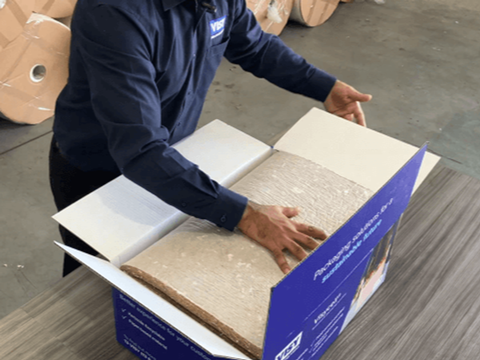
Visy’s fibre-based thermal insulation liner is intended to replace expanded polystyrene (EPS) with a kerbside recyclable alternative while maintaining the protective properties of conventional solutions.
Citing the Australian Packaging Covenant Organisation (APCO)’s assertion that less than 20% of EPS is recycled in Australia, Visy emphasizes that its Visycell insulation is made from cardboard waste offcuts and is certified as recyclable in kerbside recycling bins by APCO. This means it can display the Australasian Recycling Logo (ARL).
At the same time, it is said to share the ‘strong’ thermal and cushioning qualities of conventional EPS solutions, and has been designed to keep temperature-sensitive food and beverages fresh and safe to consume in the Australian heat.
The solution has also been designed to be flat-packed in order to help businesses cut down on transportation costs.
Apparently, Visycell has been the subject of ‘rigorous’ testing to ensure it meets the ‘highest’ standards. It is hoped to ‘significantly’ lessen the amount of EPS entering landfill or the natural environment annually.
The liner is currently being trialled by food delivery businesses in a bid to phase ‘problematic’ EPS out of their operations.
“We’re working hard to help customers ditch problematic polystyrene and we’re pleased to be trialing Visycell as a new alternative,” says Rolland Zhang, new business projects manager at Visy. “We think food and beverage customers will love Visycell—it will keep their product safe and fresh during transportation, is easily recycled and is locally made.
“We know it’s not just food and beverage companies wanting to ditch polystyrene, which is why Visycell has the potential to also be used to transport fragile goods and in building construction.”
Earlier this year, DS Smith unveiled TailorTemp, a recyclable, fibre-based, and temperature-controlled packaging solution set to replace EPS alternatives. Both the outer box and insulant materials are made of corrugated cardboard, offer a 36-hour cooling period, and can be shipped to customers in flatpack format.
2nd Level Global Solutions also revealed Solaris, a range of recyclable, paper-based thermal pallet covers set to protect palletized goods against temperature fluctuations in transit. Designed to address plastic waste in the logistics sector, it is designed to resist water and tearing and provide up to 7.5 hours of protection at 40°C.
Alternatively, a biobased additive from DGeo and Lifoam Industries is designed to break down temperature-controlled expanded polystyrene impact packaging; this is then believed to break down by 92% in a four-year period without leaving microplastics behind.
If you liked this story, you might also enjoy:
Reuse vs. single use – which is better for the environment?
Sustainable Innovation Report 2025: Current trends and future priorities
What can the world learn from South Korea’s world-leading performance in plastics circularity?














No comments yet